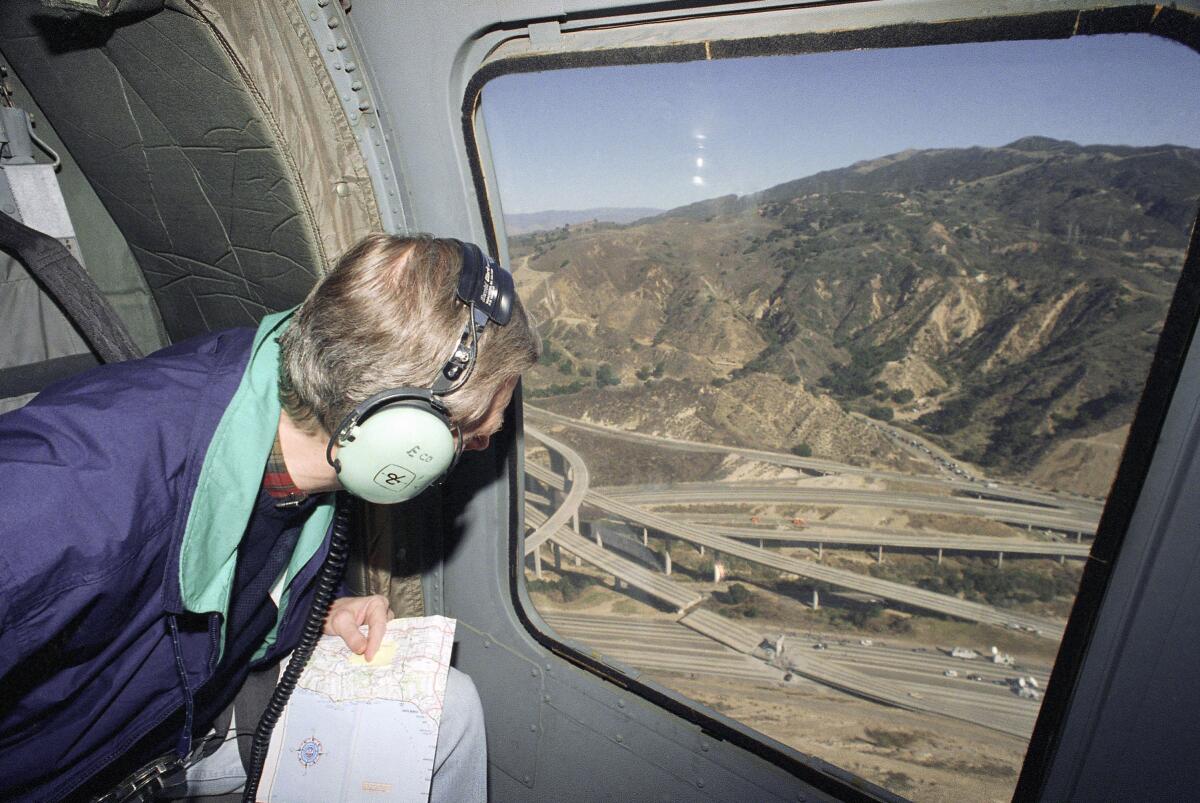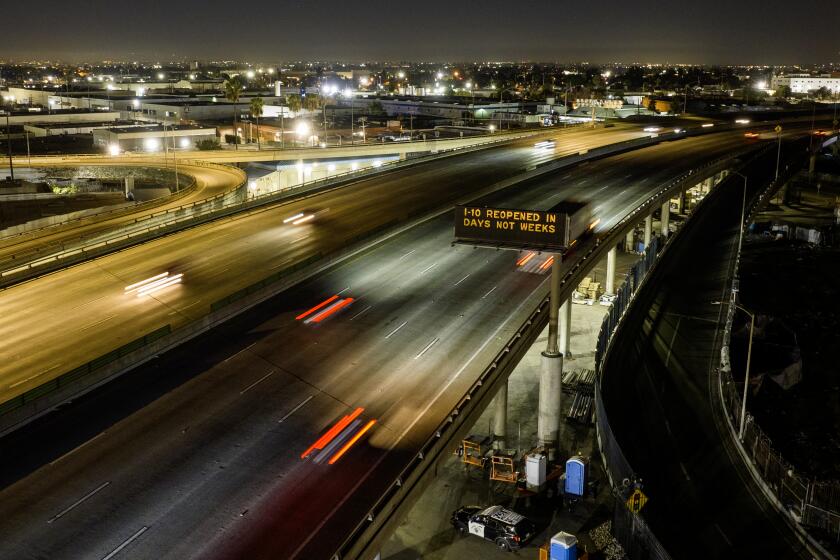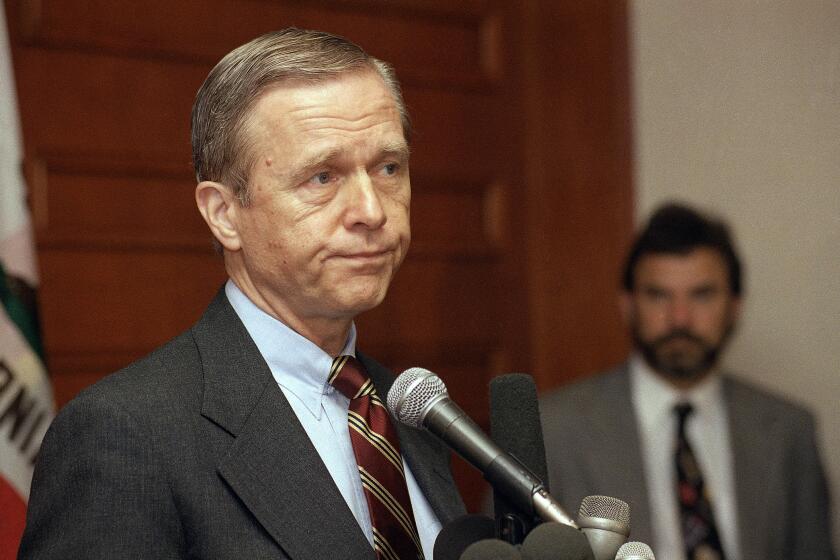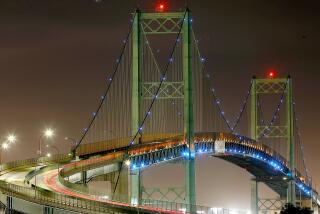Column: Pete Wilson showed how a California governor should respond to an L.A. freeway disaster

- Share via
SACRAMENTO — Congratulations to Gov. Gavin Newsom for rushing the damaged 10 Freeway back into service near downtown Los Angeles. But the all-time California freeway fixing champ is still former Gov. Pete Wilson.
In fact, Wilson’s record probably showed Newsom the political benefits to be gained by reopening a broken freeway far ahead of schedule.
Fortunately for Newsom and L.A. drivers, the task this governor faced was a relative snap compared to the multi-freeway, horrendous disaster that confronted Wilson after the magnitude 6.7 Northridge earthquake in January 1994.
Wilson’s extraordinary achievement came to mind when a Nov. 11 fire under the elevated Interstate 10 forced closure of the freeway section in both directions.
Newsom initially announced that the freeway — used by about 300,000 motorists a day — would be out of commission for three to five weeks. But a few days later — a miracle? — he announced it would be reopened well before Thanksgiving.
And on Sunday, at a freeway news conference just after dawn — also attended by Los Angeles Mayor Karen Bass, Vice President Kamala Harris and Sen. Alex Padilla — Newsom revealed that the road would reopen that night.
He thanked “the heroic work of Caltrans and union construction crews” who worked around the clock on repairs. He also lauded the cooperation between the state, city and federal governments.
Gov. Gavin Newsom announced the reopening Sunday morning with Los Angeles Mayor Karen Bass and Vice President Kamala Harris.
OK, but did Newsom initially project a much longer closure just to set himself up for heroism when he reopened the roadway much earlier than expected? Yeah, maybe that’s too cynical a thought. But being suspicious is ingrained in my line of work. Anyway, who cares as long as the road is usable?
That aside, many people are wondering why the state and city allowed flammable materials — heaps of wooden pallets and sanitizer stockpiled during the pandemic — to be stored under one of the most heavily used freeways in the country. Homeless people camp nearby and light fires to keep warm. Gosh, what could go wrong?
Lots of fingers are being pointed. The state fire marshal’s office says arson is suspected.
One reason I thought of Wilson during the interstate closure was that reopening freeways ahead of schedule after the devastating quake was a highlight of his governorship. But he gets little credit for it today.
That’s because it’s far overshadowed in Wilson’s legacy by a lowlight that soon followed the same year: His aggressive push for Proposition 187, which was aimed at cutting off public services, including education, for immigrants living here illegally.
Never mind that most voters agreed with Wilson and overwhelmingly passed the measure, which a court later threw out as unconstitutional. Millions of Latinos Californians were deeply offended by 187. Democrats skillfully demonized the Republican governor. And today he’s mostly thought of in the political world as the guy who drove Latino voters into the arms of Democrats.
But Wilson was generally a pretty effective governor, even while working with a solidly Democratic Legislature for six of his eight years in office, 1991-99.
He certainly encountered more natural disasters than any other modern governor: flooding, drought, freezes, wildfires, quakes.
The Northridge quake inflicted heavy highway damage, crippling segments on Interstate 5, the Simi Valley Freeway and — most notably — the Santa Monica Freeway. The 10 crumbled at two places: La Cienega Boulevard and Fairfax Avenue.
Wilson and Los Angeles Mayor Richard Riordan cut government red tape to expedite repair work. Wilson used his emergency powers as governor to suspend state regulations.
But Wilson’s main motivator for quick work involved old fashioned capitalism: extra profit for contractors who got the job done ahead of time.
The profit motive worked particularly well on the Santa Monica Freeway.
Contractors bid not only on how much their work would cost, but when it could be completed. C.C. Myers of Sacramento won the Santa Monica Freeway repair contract.
Since Proposition 187, the California GOP has been in freefall and still is. Today, Democrats hold a supermajority in each of California’s legislative houses and Republicans are essentially irrelevant.
The agreement was this: He’d get a $200,000 bonus for every day the job was finished ahead of schedule — and be assessed a $200,000 penalty for every day it was late.
The freeway was rebuilt in just 66 days — 73 days ahead of schedule — and the contractor received a bonus of nearly $15 million.
The bonus idea came out of the Hoover Institution at Stanford University, says Joe Rodota, who was Wilson’s cabinet secretary. One brainstormer was George P. Shultz, former secretary of State for President Reagan.
“They reached out,” Rodota says. “The governor ran with it.”
“We feared the contract would be criticized for spending too much,” Rodota adds. “So we had an economic analysis done. It showed that for every day the freeway was closed, it cost the economy $1 million. That kind of shut up the critics.”
“It was costing a fortune to merchants along the route,” Wilson recalled recently. “They provided a variety of services and people weren’t able to get to them. If we hadn’t done what we did, it would have taken God knows how much longer to reopen the freeway.”
Wilson also did this: He pressured the Clinton administration into picking up practically the entire tab. The repair work was done mostly with federal money. The governor rejected a temporary state tax increase proposed by Sacramento Democrats.
Before the quake, Wilson was badly trailing state Treasurer Kathleen Brown in his race for reelection. He wound up winning easily.
“The cleanup after Northridge gave him a chance to reintroduce himself to the voters,” says Dan Schnur, who was then a Wilson spokesman and now teaches political communications at USC and UC Berkeley.
“This could give Newsom exactly the same type of second chance with Californians beginning to wonder whether he’s paying enough attention to them.”
Newsom would say politics is the furthest from his mind.
Most motorists couldn’t care less. They’re just happy to get back on the road.
More to Read
Sign up for Essential California
The most important California stories and recommendations in your inbox every morning.
You may occasionally receive promotional content from the Los Angeles Times.













